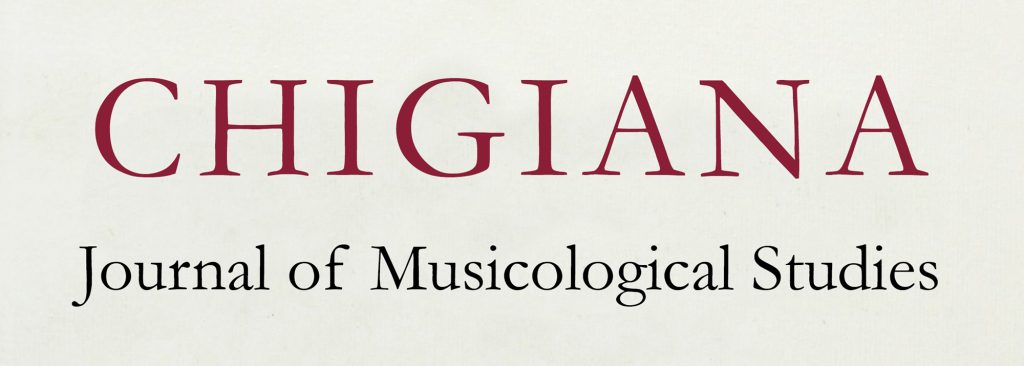
CHIGIANA CONFERENCE 2025
Music and Machines
CALL FOR PAPERS
Siena – Accademia Musicale Chigiana
4-6 December 2025
The international conference Music and Machines explores how music, computational thinking, and new technologies have reshaped musical creation, performance, and listening throughout the 20th and 21st centuries. These dynamics also open new perspectives for understanding musical practices across different historical periods.
Since the mid-18th century, musical discourse has often drawn sharp lines between human expression and mechanical imitation. Yet technologies and artifacts have continually blurred this divide, redefining the very act of making music. From early automata to sound technologies of the 20th century and today’s AI systems, machines have played a central role in musical creativity.
Algorithmic thinking has long influenced composition, and today algorithms generate dynamic, interactive music beyond traditional forms. As creative roles evolve, computational tools — both hardware and software — support new artistic practices: artificial, assisted, transmedial, and virtual. These digital extensions reshape embodiment, presence, and musical subjectivity (“Blurring Humans”).
Artificial intelligence is among the most transformative developments. Beyond technical innovation, AI is increasingly seen as an aesthetic and empathic agent (“Harmonious AI”), capable of emotionally resonant expression. These shifts affect not only musical aesthetics, but also the ontology of the work, and the relationships between body, voice, memory, and machine. At the same time, digital platforms and responsive systems are reshaping the economies of music production and distribution, opening new forms of immersive and affective interactivity. In parallel, digital and spatial technologies are changing cultural and creative economies. Practice-based research shows how these tools can foster innovation in production, dissemination, and audience engagement (“Markets in Motion”).
The conference invites reflection on how emerging technologies and AI may continue to transform music — in its forms, spaces, and social roles. Imagining the future of music means exploring new sonic frontiers and raising fundamental questions about musical experience. The primary focus is on contemporary music, but the conference also invites critical perspectives on how emerging technologies may inform the study of historical musical practices. Proposals may address, but are not limited to, the following areas:
Musical Creation and Composition
• computer-assisted composition
• empathetic AI and emotional computing
• machine learning and artificial intelligence in music
• systemic thinking and new sound imaginaries
Technologies and Instruments
• hyper-instruments (augmented musical instruments)
• musical instrument construction and design
• musical instruments for musicians with motor or sensory disabilities
• musical interfaces and interaction systems
• technologies for augmented reality and virtual reality in music
Performance and Interaction
• embodiment and digital extensions in performance
• interaction between music and machines in performative practices
• music, VJing, and live editing
• transmedial musical performances
Philosophies, Aesthetics, and Society
• epistemologies and phenomenologies of machines
• ethical challenges in AI-generated music
• ontology of the musical artwork in the digital era
• posthumanism, metahuman, and transhuman musical aesthetics
• the voice and artificial intelligence
Formats, Economies, and Industries
• analysis and practice of technological music
• digital audio formats (linear music formats and compressed audio technologies)
• digital music economies
• production and post-production in the digital age
• from sound art to sonic cultures
• historical reconstruction and simulation through emerging technologies (e.g., VR/AR)
• availability and creative repurposing of AI resources (open-access vs. proprietary systems in cultural production)
Submission Information
The official languages of the conference are English and Italian.
A selection of the presented papers will be published in the 2026 volume of the journal Chigiana. Journal of Musicological Studies (https://journal.chigiana.org/).
Proposals must be submitted to chigiana.journal@chigiana.org no later than June 30, 2025.
Each proposal (to be sent in a single Word file) should include:
– the title of the paper;
– the name(s) of the speaker(s);
– the affiliation(s) of the speaker(s);
– an abstract of approximately 300 words.
Format of presentations: in-person; 20 minutes + 10 minutes Q&A, unless otherwise noted.
Selection criteria: proposals will be evaluated by the Scientific Committee based on originality, clarity, and relevance to the conference theme.
Scientific Committee:
Giacomo Albert, Nicola Bernardini, Simone Caputo, Christoph Flamm, Christopher Haworth, Stefano Jacoviello, Deirdre Loughridge, Curtis Roads, Jennifer Walshe
Organising Committee:
Angelo Armiento, Antonio Artese, Antonio Cascelli, Marica Coppola, Matteo Macinanti, Susanna Pasticci, Nicola Sani, Marta Sabatini, Giovanni Vai
